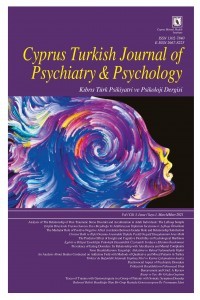Yeme Tutumları ve Depresyon Belirtileri İlişkisinde Duygu Düzenleme Güçlüğünün Aracı Rolü
Amaç: Geç ergenlik ve erken yetişkinlik dönemi arasındaki geçiş dönemine denk gelen beliren yetişkinlik dönemi, gelişimsel özellikleri dolayısıyla psikopatolojilerin gelişmesinde riskli bir dönemdir. Depresyon ve yeme bozuklukları gibi eş zamanlı görülebilen psikopatolojilerin gelişiminde ve sürmesinde rol oynayan psikolojik faktörlerden biri ise duygu düzenleme güçlükleridir. Koronovirüs salgın döneminde yürütülen mevcut çalışmada, beliren yetişkinlerde riskli yeme tutumları ile depresif belirtiler ilişkisinde duygu düzenleme güçlüğünün aracı rolü incelenmesi amaçlanmıştır. Yöntem: Araştırma örneklemini, 18-25 yaş aralığında 227 kadın 144 erkek toplam 371 kişi oluşturmaktadır. Veri toplama aracı olarak Beck Depresyon Envanteri, Duygu Düzenlemede Güçlükleri Ölçeği ve Yeme Tutum Testi Kısa Formu kullanılmıştır. Veriler, koronavirüs salgını döneminde çevrimiçi olarak toplanmıştır. Sonuçlar: Basit aracılık model testi sonuçları, yeme tutumlarının duygu düzenleme güçlüğü aracılığıyla depresyon belirtileri üzerindeki dolaylı etkisini göstermiştir. Depresyon belirtileri üzerindeki etkisi kontrol edilmek üzere aracılık modeline dahil edilen cinsiyet ve beden kitle endeksinin etkisi anlamlı değildir. Tartışma: Araştırmanın bulguları, beliren yetişkinlerde riskli yeme tutumlarının, duygu düzenleme güçlüklerini artırarak depresif belirtileri de artırdığı göstermiştir. Bulgular ve klinik doğurguları ilgili alanyazın ışığında tartışılmıştır.
The Mediating Role of Emotion Regulation Difficulties in the Relationship Between Eating Attitudes and Depressive Symptoms
Objective: Emerging adulthood, which coincides with the transition period between late adolescence and early adulthood, is a risky period in the development of psychopathologies due to its developmental characteristics. Emotion regulation difficulties are one of the psychological factors that play a role in the development and maintenance of co-occurring psychopathologies such as depression and eating disorders. In the current study, which was conducted during the coronavirus pandemic, it was aimed to examine the mediating role of difficulty in emotion regulation in the relationship between risky eating attitudes and depressive symptoms in emerging adults. Method: The research sample consists of 371 people, 227 women and 144 men, between the ages of 18-25. Beck Depression Inventory, Difficulties in Emotion Regulation Scale, and Eating Attitudes Test-Short Form were used for data collection. The data were collected online, during the coronavirus pandemic. Results: The results of the simple mediation model test showed the indirect effect of eating attitudes on depression symptoms through emotion regulation difficulties. The effects of gender and body mass index, which were included in the mediation model to control the effect on depression symptoms, were not significant. Discussion: Findings of the study indicated that risky eating attitudes in emerging adults increases emotion regulation difficulties, which in turn increases depressive symptoms. The findings and their clinical implications are discussed in the light of the relevant literature.
___
- Aldao, A., Nolen-Hoeksema, S. ve Schweizer, S. (2010). Emotion-regulation trategies across psychopathology: A meta-analytic review. Clinical Psychology Review, 30(2), 217-237. doi: 10.1016/j.cpr.2009.11.004
- Arnett J. J. (2000). Emerging adulthood: A theory of development from the late teens through the twenties. American Psychologist, 19(55), 469-480.doi: 10.1037/0003-066X.55.5.469
